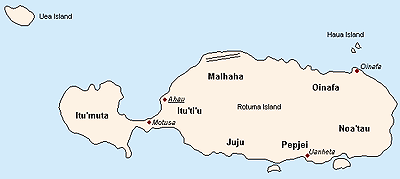 Rotuma is a Fijian dependency, consisting of Rotuma Island and nearby islets. The island group is home to a small but unique indigenous ethnic group which constitutes a recognizable minority within the population of Fiji, known as "Rotumans". Its population at the 2007 census was 2,002, although many Rotumans live on mainland Fijian islands, totaling 10,000.
Rotuma is a Fijian dependency, consisting of Rotuma Island and nearby islets. The island group is home to a small but unique indigenous ethnic group which constitutes a recognizable minority within the population of Fiji, known as "Rotumans". Its population at the 2007 census was 2,002, although many Rotumans live on mainland Fijian islands, totaling 10,000.
Linguistic evidence suggests an original settlement from Fiji. Linguists include the Rotuman language in a subgroup with the languages of western Fiji, but Rotuman also has a large number of Polynesian loanwords, indicating later contact with Samoa and Tonga.
Rotuman oral history indicates that the islands' first inhabitants came from Samoa, whence they were led by a man named Raho. Shortly thereafter, further settlers arrived from Tonga. Later, additional settlers came from Tonga and Kiribati. In the 1850s and 1860s, Tongan Prince Ma'afu claimed Rotuma, and sent subordinates to administer the main island and islets.
The first known European sighting of Rotuma was in 1791, when Captain Edward Edwards and the crew of HMS Pandora landed in search of sailors who had disappeared following the Mutiny on the Bounty. There has been some argument whether the island discovered by Quirós known as Tuamaco fits the description and location of Rotuma, but so far no claim has been fully substantiated.
Although the island has been politically part of Fiji since 1881, Rotuman culture more closely resembles that of the Polynesian islands to the east, most noticeably Tonga, Samoa, Futuna, and Uvea. Because of their Polynesian appearance and distinctive language, Rotumans now constitute a recognizable minority group within the Republic of Fiji. The great majority of Rotumans (9,984 according to the 2007 Fiji census) now live elsewhere in Fiji, with 1,953 Rotumans remaining on Rotuma. Rotumans are culturally conservative and maintain their customs in the face of changes brought about by increased contact with the outside world. As recently as 1985, some 85 percent of Rotumans voted against opening the island up to tourism, wary of the influence of Western tourists. P&O Cruises landed on the island twice in the 1980s.
Rotuma was governed as an integral part of the Colony of Fiji after cession to Great Britain in 1881. Following Fiji's independence in 1970 and the military coups of 1987, Rotuma remained with Fiji.
From Wikipedia, the free encyclopedia

